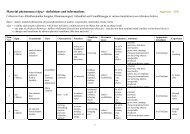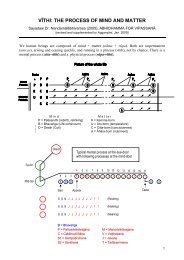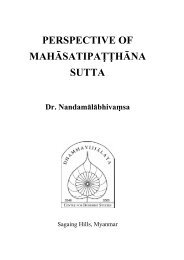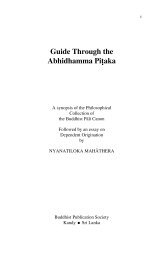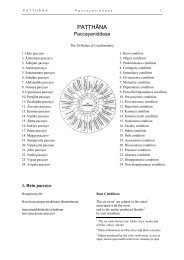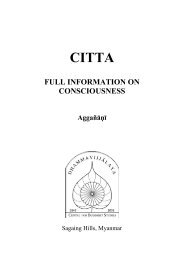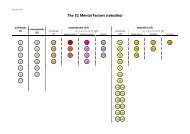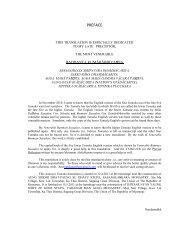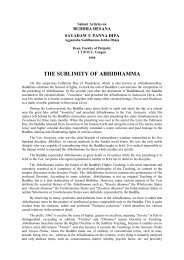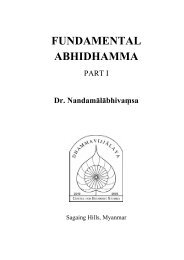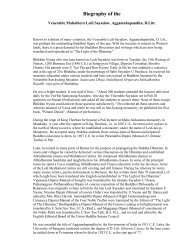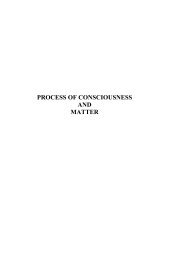ABHIDHAMMA IN DAILY LIFE - Abhidhamma.com
ABHIDHAMMA IN DAILY LIFE - Abhidhamma.com
ABHIDHAMMA IN DAILY LIFE - Abhidhamma.com
You also want an ePaper? Increase the reach of your titles
YUMPU automatically turns print PDFs into web optimized ePapers that Google loves.
Lack of moral shame in pali is ahirika.. Taking life, to kill a living being, for the virtuous is bad;<br />
but there are people who do this for a living.<br />
When delusion (moha) arises in you, it leads you to (shamelessness); so even the wise could<br />
<strong>com</strong>mit wrong shamelessly. Therefore, those who acclaimed to be wise should judge with their<br />
own experiences based on moral shame.<br />
Example:<br />
In the case of the hermit given in the above example, the hermit Haritaca, he was shameless to<br />
have <strong>com</strong>mitted an unwholesome act with the Queen. The hermit was a holy man of the first<br />
grade in virtue who had already attained supernormal power - abhinnas (the higher knowledge’s<br />
and holiness). What the hermit did was a shameful act of lust due to reactive delusion. Such a<br />
mean and degrading act was <strong>com</strong>mitted because of utter delusion, and shamelessness,.<br />
Every unwholesome deed is shameful and dishonorable. Acts like this, acts of hatred such as<br />
abusing others, fuming and shouting, using coarse vulgar language, being puffed up with vain<br />
conceit, looking down upon others with foolish pride, decrying others in an indirect, allusive<br />
manner out of malicious envy, etc., are disgusting and shameful. Therefore, we should bear in<br />
mind that all unwholesome deeds are shameful. The mind that arises together with this<br />
shamelessness is "a shameless mind".<br />
2.1.3. Moral Fearlessness – (Anottappa)<br />
Lack of moral dread is having no fear, no dread (anottappa). In other words, moral fearlessness<br />
means devoid of moral dread. Evil deeds are like an open flame. It is like the moths. In fact, the<br />
open flame is to be very much dreaded. However, moths do not think the open flame as dreadful<br />
and recklessly fly into the flame. In fact, evil deeds cause a variety of sufferings; so they are<br />
indeed to be dreaded. However, delusion conceals those resultant sufferings; and moral<br />
fearlessness does not see them as dreadful. Those factors prompt you to act evil deeds boldly.<br />
Thus, moral fearlessness could result in undesirable situations.<br />
a. Loss of Self-esteem - Attanuvada-bhaya- the danger of blaming or accusing oneself, losing<br />
self-respect and having no self-esteem. Such a person would be oppressed by the thought,<br />
"Though many people think I am a virtuous gentleman, I know myself: I am not a virtuous man<br />
as they think. I am a wicked man who does evil deeds stealthily." (atta oneself + anuvada blame,<br />
accuse)<br />
b. Loss of Respect - Paranuvada-bhaya-: the danger of being blamed, being accused by others in<br />
this way, "You are a wicked person, doing unwholesome, evil deeds." (para by others; anuvada<br />
blame, accuse)<br />
c. Be<strong>com</strong>ing a victim - Danda-bhava - the danger of suffering and punishment such as being<br />
killed by others for having <strong>com</strong>mitted murder; being beaten by the owner for having stolen his<br />
property; being killed for <strong>com</strong>mitting adultery; being imprisoned for various criminal acts.<br />
Page 11 A Gift of Dhamma Maung Paw, California



